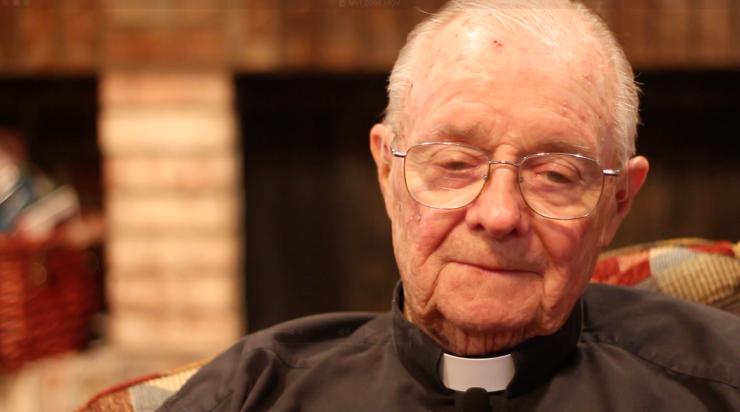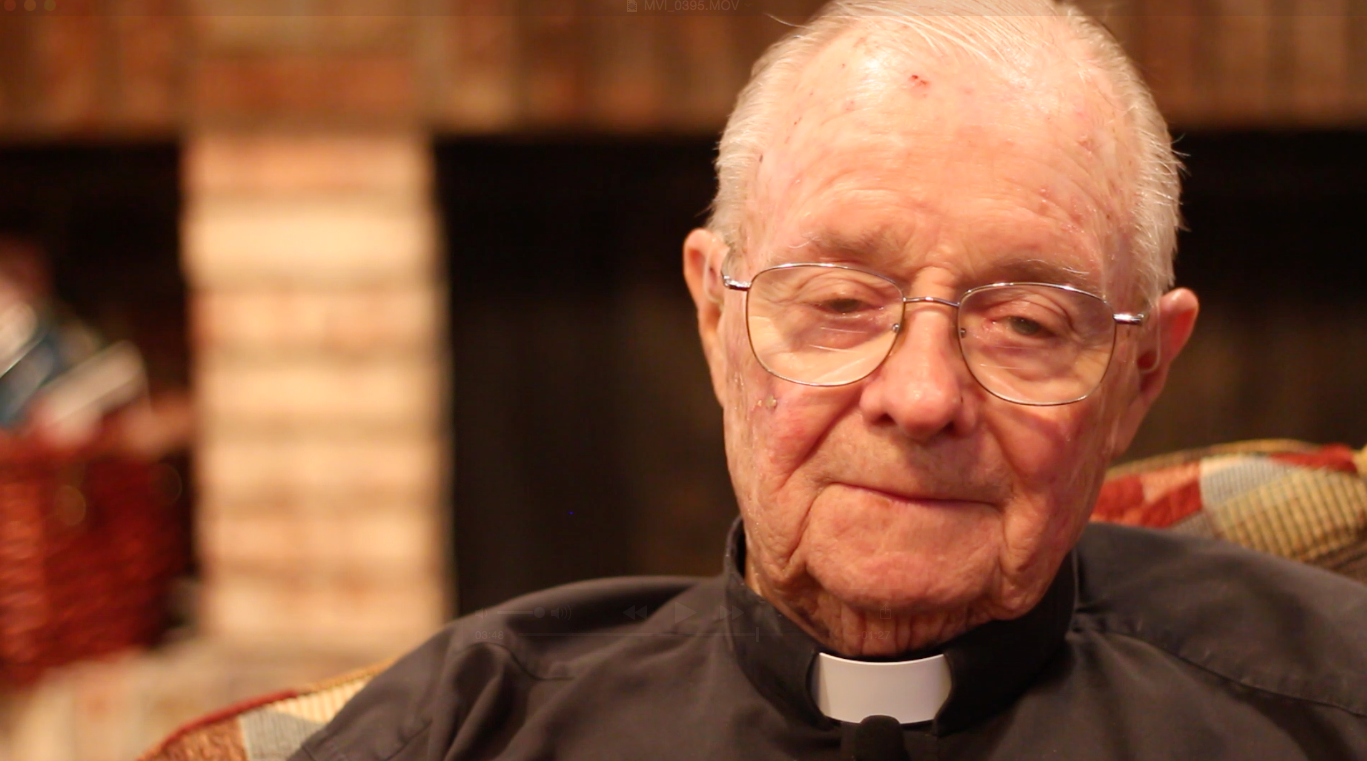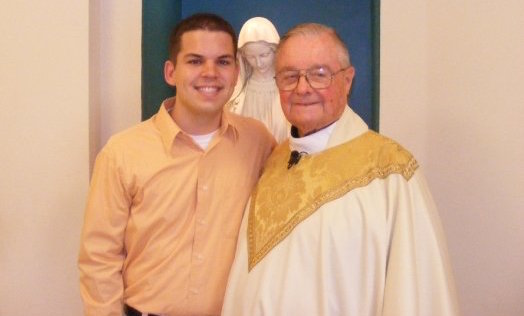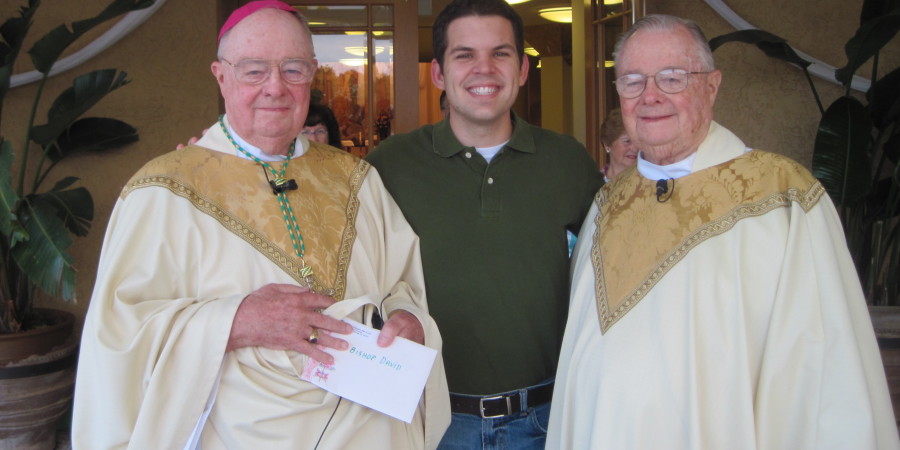Last week, our family grieved the loss of Fr. Ed Thompson, a spiritual giant who had an enormous impact on our community. At age 92, he was the oldest active priest in the Diocese of Orlando.
But more than that, he was our priest. He served for over 20 years at our parish, St. Mary Magdalen in Altamonte Springs, FL, and was extremely close to our family: he married me and Kathleen, baptized our children, and served as my confessor and spiritual guide ever since I became Catholic in 2008. Two months after I entered the Church, he and I began meeting weekly for instruction, prayer, and spiritual conversation. We spent hundreds of hours together over the last eight years.
Fr. Ed’s story is a remarkable one, beginning with great success as a young priest and then spiraling into addiction and suspension from the priesthood. Yet through God’s grace, it’s ultimately a story of redemption.
Fr. Ed’s mother discovered she was pregnant in 1922, and the doctors were worried. She was already in delicate health, so when they learned she was pregnant with twins, they strongly urged her to abort the pregnancy, or at least one of the twins. They thought it would be too dangerous to continue full term, and warned that if she went through with it, she would likely either die (worst case) or suffer as a cripple for the rest of her life with rheumatoid arthritis (best case.)
Yet she refused their advice.
As it turns out, the doctors were correct in their prediction. After giving birth to Ed and David Thompson on May 29, 1923, in Philadelphia, PA, their mother indeed developed rheumatoid arthritis and suffered with it for the rest of her life.
When the boys were born, the arthritis had already become so bad that she couldn’t even hold the new babies. She was able to do one thing, though: as the nurse brought the boys near, their mother took their hands, one at a time, and helped them make the sign of the cross over their foreheads. (Fr. Ed would later see this as a foreshadowing of the thousands of priestly blessings he and his brother issued over the years.)
As the two boys grew, they became drawn to religious service. They decided to both enter the seminary, studying under great professors and falling under the influence of Archbishop Fulton Sheen. Sheen became their great hero and they were able to meet him on several occasions. Once, while the boys attended one of Sheen’s radio recordings, Sheen walked up to the twins, who were in seminary at the time, and said, “Seminarians! Future priests! TWINS!” Sheen then embraced the two boys, looked at them with his piercing eyes, and offered his advice: “Persevere. Persevere. Persevere.” How prescient that advice would become.
Fr. Ed was ordained a priest in 1951. Not long after, he became the director of vocations for the Archdiocese of Philadelphia, where his work remains legendary. Most dioceses today would be thrilled to ordain three or four guys each year. But as vocations director, Fr. Ed consistently guided scores of young men to the priesthood. One year, he saw over 100 men ordained from his diocese! For this extraordinary work, Fr. Ed was awarded the honorary title “Monsignor” (though he would always prefer to be called “Father”.)
As vocations director, one of Fr. Ed’s tasks was to organize a massive event celebrating the World Day of Prayer for Vocations, which was to be held in Philadelphia one particular year. His bishop told him that it was his job to pack out the cathedral. So Fr. Ed reached out to the most famous, magnetic person he knew, someone he was sure would draw a crowd: Archbishop Sheen.
Sheen had worked with Fr. Ed on retreats in the past, and graciously agreed to come. But Fr. Ed wasn’t done yet.
He wanted to make an even bigger splash, so he also wrote to a little Albanian nun halfway across the world, Mother Teresa of Calcutta, inviting her to come and speak, too. Surprisingly, she said she yes. She was already planning a trip to America and said she would be happy to squeeze in the prayer event.
Crowds poured in for the World Day of Prayer celebration. It spilled out into the streets and parks around the Philadelphia cathedral. In fact, Mother Teresa delivered her main message at Benjamin Franklin Parkway, near the famous Rocky statue at the stairs of the Philadelphia Museum of Art.
Before the event started, the speakers and organizers gathered for prayer in the cathedral sacristy. Fr. Ed remembers the experience of holding hands with two living saints: “We prayed together and I had Fulton Sheen’s hand in my right, and Mother Teresa’s hand in my left.”
By this time in his life, it seemed clear that the Holy Spirit had destined Fr. Ed for great things, perhaps even to become a bishop (as his twin brother became.) But the tide soon turned. On November 8, 1960, John F. Kennedy, an Irish Catholic, was elected President of the United States. Fr. Ed joined a few other priest friends at a local bar, to celebrate the election of America’s first Catholic president. He had a few drinks, perhaps one too many. Those drinks led to more the next day, and then the next. Soon, Fr. Ed couldn’t stop. His friends noticed him becoming more abrasive and unreliable. He missed events, snapped at his friends, and spent more and more time drinking. Though he wouldn’t admit it then, he was in serious trouble.
He was an alcoholic.
After several disturbing mishaps in Philadelphia, Fr. Ed was sent to a diocese in Nevada. He had more problems there. The bishop gave him many chances to reform himself, but finally gave up. He stripped Fr. Ed of all his priestly faculties, telling him, “You will never serve as a priest again.”
That devastating decision only pushed Fr. Ed closer to the bottle. He was depressed, hopeless, and saw no meaning in his life. Being a priest was everything to him, and now it had been taken away.
The drinking continued, as did his despair. He wanted to escape the addiction. He wanted to free himself. He wanted to return to the priesthood. But there was no light at the end of the tunnel.
The dark days blurred into one another, until one day, he received a surprising message. It came from a lady who lived in Florida. At first he didn’t recognize her name. Her letter explained that many years ago, when Fr. Ed was still an active priest in Philadelphia, the lady had confided that God spoke to her, and that he wanted her to live an austere, consecrated life, though not through a religious order. She shared the message with several priests and leaders in her parish, but nobody believed God had actually spoke to her. Most of them dismissed her and suggested she look for a good husband and just get married.
“But,” she wrote, “You listened to me. You believed me. And you believed in me. I never forgot that.” For the last several years, the woman had lived the consecrated single life to which she felt God called her. Then recently, out of the blue, she sensed another message from God: “Fr. Ed Thompson needs your help. You need to find him and contact him.” She didn’t know why Fr. Ed was in trouble—they hadn’t spoken for years—and she didn’t know how to reach him. She didn’t know how she could help. But she trusted the impulse and decided to act.
She contacted the Archdiocese of Philadelphia, and after several attempts, eventually learned that Fr. Ed had been removed from the active priesthood and was now somewhere in Nevada. She tracked him down and sent the message: “Fr. Ed, we haven’t spoken in years, and you probably don’t remember me. But you once believed in me. You helped me when nobody else would. Now I believe in you, and I want to help.”
When she learned of his alcoholism, she invited him to come to Florida, where she could host him in her house and help him get back on his feet. Although it was one of the most humbling experiences in his life, Fr. Ed swallowed his pride and accepted the offer.
Heading to Florida was an admission that he couldn’t find healing on his own. He needed help. He moved in with this middle-aged woman, who lived in an old house with a bunch of cats. Fr. Ed was no longer allowed to say Mass publicly, but he received special permission to say Mass, once a day, privately in his room. The cats were his only parishioners (he remembered them meowing during his homilies, “but whether in approval or disdain I never knew.”)
Fr. Ed slowly adjusted and found stability. He started showing up for daily Mass at St. Mary Magdalen, a nearby parish, but not as a priest. He just sat in the pews, quiet and reserved. It took a while before anyone discovered his past ministry. Once the truth came out, the parish pastor at the time, Fr. Paul Henry, was a bit surprised. It was strange to see a priest as young as Fr. Ed who was retired. So he reached out to Fr. Ed to learn his story.
Fr. Ed shared the details. Fr. Paul sensed a good and faithful heart, but a man who was still on the road to recovery; he detected the lingering effects of addiction. So he suggested Fr. Ed enter Alcoholics Anonymous (AA). Once again, Fr. Ed sucked up his pride, connected with a man in the parish who would serve as his sponsor, and signed up for AA.
AA was arduous, as it is for most addicts. But after many months, he became clean of alcohol and would never drink again (even his later Masses would be celebrated using special wine with minuscule traces of alcohol.)
After seeing his progress, Fr. Paul floated the idea of Fr. Ed perhaps returning to active ministry. Fr. Ed couldn’t believe it. The most depressing part of his alcoholism was that it stripped him of his purpose and identity as a priest. He wanted nothing more than to recover that, to say Mass, to hear confessions, to usher people into the Kingdom of God.
It would take a lot of work to restore his faculties. A group of bishops convened to discuss the case, including Fr. Ed’s brother (then a bishop in South Carolina), Fr. Ed’s former bishop in Nevada (who was leery of the idea, saying “I’ve been burned by Ed one too many times”), and the then-bishop of Orlando, Bishop Norbert Dorsey. After much debate and discussion, they reluctantly agreed that with the support and guidance of Fr. Paul, Fr. Ed could resume his ministry as an active priest at St. Mary Magdalen.
Fr. Ed was overjoyed. He got his priesthood back. It was one of the best days of his life—”Next to my baptism,” he would later say—and he would remember its anniversary each year. After a long, dark journey of depression, addiction, and hopelessness, he had finally found redemption. He now had meaning. He could now be, once again, what God had called him to: a priest to his people.
For the next 23 years, Fr. Ed served the community at St. Mary Magdalen with heroic devotion and vigor. His two great privileges, he would often say, were to offer Mass and impart forgiveness through Confession. He said Mass every single morning, with few exceptions, over those decades—over 8,000 Masses. He heard thousands of confessions and was a fixture in the confessional every Saturday afternoon. He’s still remembered in our parish as “Easy Ed,” not just for the simple but profound penances he assigned, but for his merciful approach. In many ways, his pastoral demeanor anticipated that of Pope Francis. He was a father of mercy who sought above all, in the pope’s words, to “heal the wounds, heal the wounds.”
Fr. Ed served as hospital chaplain, chaplain to the Knights of Columbus, and taught many classes on Scripture and faith formation. To say he was a beloved priest in our parish would be an understatement.
Although he overcame many health struggles and survived his twin brother and only sister, Betty, Fr. Ed passed away on February 11, 2016. His funeral was held Thursday night, and the church couldn’t even hold half the crowd. Thousands of attendees spilled over into our parish meeting hall, where the funeral was simulcast and which was also bursting at the seams.
The night before, the parish held a wake service for Fr. Ed, and a few parishioners were invited to reflect on his life and impact, including my wife, Kathleen, and me. Although the above story, remarkable in so many ways, captures his life in broad strokes, I offer my personal testimony below of how this great priest shaped my life in particular.
My story with Fr. Ed Thompson began and ended at his two favorite places in the world: the altar and the confessional.
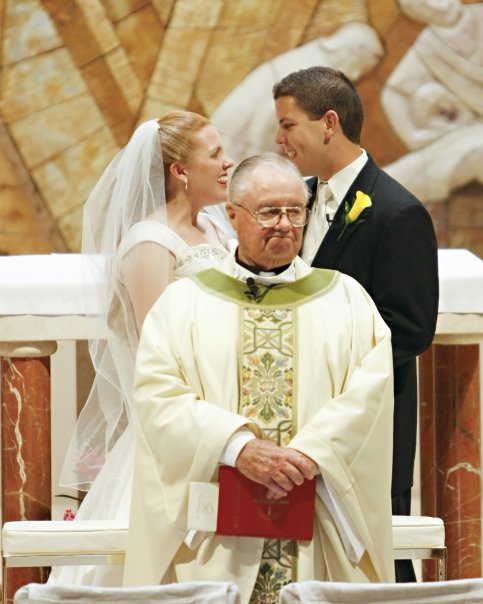 He stood at the altar on May 17, 2008, as he celebrated my and Kathleen’s wedding. A few months later, I mentioned to Kathleen that, as a fairly new Catholic (I had entered the Church just two months earlier), I wanted to study under a wise and holy Catholic, someone who could take me deeper in faith. Kathleen quickly replied, “Oh, you need to meet with Fr. Ed.”
He stood at the altar on May 17, 2008, as he celebrated my and Kathleen’s wedding. A few months later, I mentioned to Kathleen that, as a fairly new Catholic (I had entered the Church just two months earlier), I wanted to study under a wise and holy Catholic, someone who could take me deeper in faith. Kathleen quickly replied, “Oh, you need to meet with Fr. Ed.”
I asked Fr. Ed, and he agreed to meet. Over the next several years, we got together just about every week. We spent hundreds of hours together, and we talked about everything—God, the Church, Jesus, Mary, our vocations, and much more. Fr. Ed became my confessor, my spiritual guide, my confidant, and most of all, my friend—one of my closest friends.
It’s impossible to justly summarize such a rich friendship. But upon reflection, three things stand out to me. First, was Fr. Ed’s generosity. It was said about Fulton Sheen, Fr. Ed’s great hero, that you should never compliment anything in his house—or else he’d make you take it! One day, Sheen’s nieces were visiting when one of the young girls said, “Oh, what a nice lamp!” Next thing she knew, she was walking home with the lamp in her hands. Other people left Fulton Sheen’s house with wall paintings, vases, or statues.
Fr. Ed was just like that. Whenever I met with him, I learned quickly not to compliment or even comment on any of the books stacked around his shelf or his desk. This was hard, since we are both book lovers and we loved to discuss old books, new books, and whatever we were reading. But if I even said, “Oh, I heard great things about that book!” he would make me take it home. Even if I was able to keep my lips shut, he still sent me off with a handful of books. In fact—and I’m not kidding—on at least three occasions I departed with a black garbage bag full of books! Fr. Ed was one of the most detached people I have ever met. He knew, with assurance, that his treasures were stored up in heaven and that his possessions on earth were only passing, and because of that, he was open-handed with everything—his books, his money, his meals, and especially his time. He was the embodiment of self-gift. His life was a lesson for us, to let go of our possessions and see them only as tools or gifts for others.
A second thing that sticks out is Fr. Ed’s resolute focus on the One Thing, namely, knowing and loving Jesus Christ. Anyone who knew Fr. Ed, or heard him preach, will recognize this as his single, driving concern: to help others encounter Jesus Christ. For Fr. Ed, Jesus wasn’t just an interesting historical figure or a pious symbol. He was a real, living person, as alive as you, or me, or Fr. Charlie. While Fr. Ed knew Jesus as his Savior and Lord, he also knew him as his friend. And he spoke of him that way. He talked to Jesus, he sat with Jesus, he thought with Jesus. Fr. Ed once told me that the mission of his life was the same as Mary’s: to point others to Jesus—he wanted everyone to know Christ, and not just know about him (which is why his favorite book to recommend to people was Frank Sheed’s To Know Christ Jesus.) The philosopher Soren Kierkegaard said that a saint is someone “who is about one thing”. You could say that about Fr. Ed: he was about One Thing: knowing and loving Jesus, the Lord.
Finally, the lasting image I have of Fr. Ed is of mercy. I don’t think it’s a coincidence that God waited to take Fr. Ed into his glory until the Year of Mercy, which we’re celebrating right now. Anyone who saw Fr. Ed for confession knows he was a man of deep mercy.
My very last encounter with Fr. Ed came about 3-4 weeks ago, in the confessional he so loved. He was a fixture in that confessional for years, every Saturday afternoon. It was his favorite place to be. But this particular day was the last time he would ever hear confessions, and it was also the final time we would ever talk. I heard in his trembling, wavering voice, and I saw in his teary eyes, that he knew this would be our last meeting. And I sensed it, too.
The very last words Fr. Ed spoke to me were these: “I absolve you of all of your sins, in the name of the Father, and of the Son, and of the Holy Spirit.” And then he paused, looked me in the eyes, and said, “Brandon, God love you—I love you.” We embraced, we said goodbye, and that was it.
After I heard the news of his death, I thought, “How fitting—how fitting it was that the last words he spoke to me were words of forgiveness and love: ‘I absolve you of all of your sins’ and ‘I love you’.” How fitting because those last words of Fr. Ed to me were also the last two actions of Jesus on the Cross: forgiveness and love. Thus, Fr. Ed died in the same way as Jesus—in imitation of Christ, to quote another of his favorite books.
Knowing Fr. Ed as I did, I can think of no better words that he would want for his legacy than forgiveness and love, the two arms of mercy. That sums up Fr. Ed Thompson. He was a friend, he was a pastor, he was a spiritual giant, but maybe above all, he was a man of forgiveness and love, a man of deep mercy.

